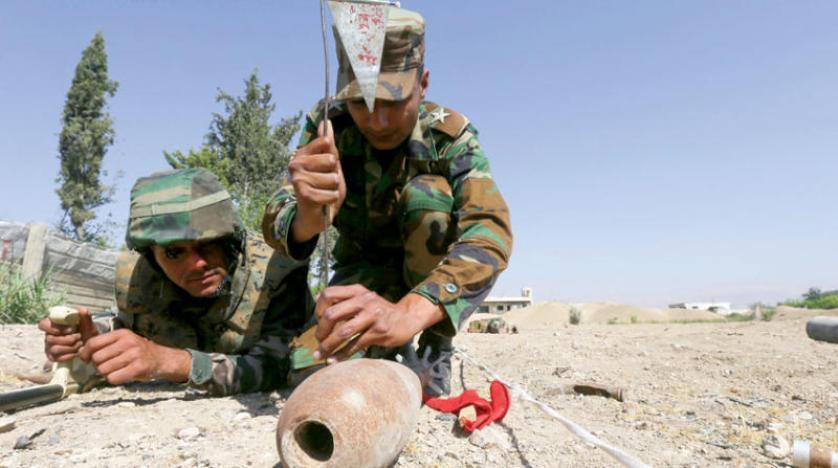Whenever Turkey threatens to launch a military operation in northern Syria to establish a “safe zone,” Russia puts on the mediation table the revival of the Sochi Agreement on the east of the Euphrates, in preparation for the implementation of the Adana Agreement. The latter was signed by Ankara and Damascus in July 1998, establishing security cooperation between the two parties and allowing the Turkish army to pursue the Kurdistan Workers Party (PKK) deep into Syrian territory.
Since the Russian war in Ukraine, Turkish President Recep Tayyip Erdogan has activated his old plan to establish a safe zone with a depth of 35 kilometres, trying to benefit from the improvement of Ankara’s negotiating position due to Washington and Moscow’s “need” for Turkey’s role.
America clearly announced its rejection of the military operation east of the Euphrates, while Moscow mediated between Damascus, Ankara and the Kurds and deployed Syrian army forces in various areas in the north of the country to “deter” the Turkish army ahead of the Russian-Turkish-Iranian summit in Tehran on Tuesday.
Read Also: Tal Rifaat: Turkey Intensifies Raids and Confuse the Regime’s Deployment Operations
Ankara wants new incursions linking its military “enclaves” in northern Syria, namely the Euphrates Shield, north of Aleppo, which was established in 2016, the Olive Branch in Afrin in 2018, the Peace Spring, eEast of the Euphrates, formed at the end of 2019, and the Peace Shield, at the start of 2020.
Moscow proposes either activating the Adana Agreement or the full implementation of the Sochi Agreement of 2019, in addition to a military memorandum between Damascus and Qamishli in exchange for an agreement between Ankara and Washington. Below is a review of the most important agreements:
What are the terms of the Adana Agreement?
After Turkey threatened to attack Syria in mid-1998, late Egyptian President Hosni Mubarak mediated between the two parties, until a security agreement was concluded between Ankara and Damascus in the Turkish city of Adana. The text of the agreement and its annexes included, among others, the following items:
– As of now, the leader of the Kurdistan Workers’ Party, Abdullah Ocalan (detained in Turkey since the beginning of 1999), will not be in Syria, and will certainly not be allowed to enter Syria.
– PKK members abroad will not be allowed to enter Syria.
– As of now, PKK camps will not operate on Syrian soil, and will certainly not be allowed to become active.
– Many members of the PKK were arrested and referred to court. The lists containing their names were prepared and submitted by Syria to the Turkish side.
– Syria, based on the principle of reciprocity, will not allow any activity launched from its territory that harms the security and stability of Turkey. Nor will Syria allow the supply of weapons, logistical materials, and financial and promotional support for PKK activities on its soil.
– Syria has classified the PKK as a terrorist organization and banned the activities of the party and its affiliated organizations on its territory, along with other terrorist organizations.
– Syria will not allow the PKK to establish camps or other facilities for training and shelter purposes or to conduct commercial activities on its soil.
– Syria will not allow members of the Kurdistan Workers Party to use its territory to cross to third countries.
– A direct telephone line is immediately operated between the higher security authorities of the two countries.
– The two parties appoint special security representatives in their diplomatic missions in Ankara and Damascus. Those are presented to the host country’s authorities by the mission heads.
– Annex No.3: As of now, the two parties consider that their border disputes have ended and neither of them has any claims or rights due in the territory of the other party.
– Annex No. 4: The Syrian side understands that its failure to adopt the security measures and duties stipulated in this agreement gives Turkey the right to implement all necessary security measures inside Syrian territory to a depth of five kilometres.
What does the Adana Agreement mean at the political and security levels?
- It gives the Turkish army the right to pursue the PKK at a depth of five km in northern Syria, according to Annex No. 4.
- Damascus relinquishes any claim to its rights in Iskenderun (Hatay Province), which Turkey annexed in 1939, according to Annex No. 3.
- The PKK, led by Abdullah Ocalan, is considered a “terrorist organization”, in accordance with the provisions of the agreement.
- Ankara interprets the agreement as meaning that the Kurdish People’s Protection Units (YPG) is a “terrorist organization”, as an extension of the PKK.
- The agreement means the start of direct security contacts, knowing that the Director of Syrian National Security, Ali Mamlouk, has held several meetings with Turkish Intelligence chief Hakan Fidan.
- It also means re-operating the Turkish embassy in Damascus and the Syrian embassy in Ankara, noting that Damascus has a consulate in Istanbul, given that the agreement requires the appointment of a security liaison officer in each embassy.
- The agreement entails “indirect contacts” acknowledged by Turkish Foreign Minister Mevlut Cavusoglu, and Ankara’s recognition of the legitimacy of the Syrian government, as it required many procedures, including forming a joint committee and the operation of a hotline.
- The agreement offers an alternative to the Turkish-American understanding on the depth of the “buffer zone” of 32 kilometres in northeastern Syria. It opens the way for implementing the Sochi Agreement between Erdogan and President Vladimir Putin in October 2019, following former US President Donald Trump’s decision to withdraw his forces from the east of the Euphrates, which paved the way for a Turkish attack at the time.
This article was edited by The Syrian Observer. The Syrian Observer has not verified the content of this story. Responsibility for the information and views set out in this article lies entirely with the author.


